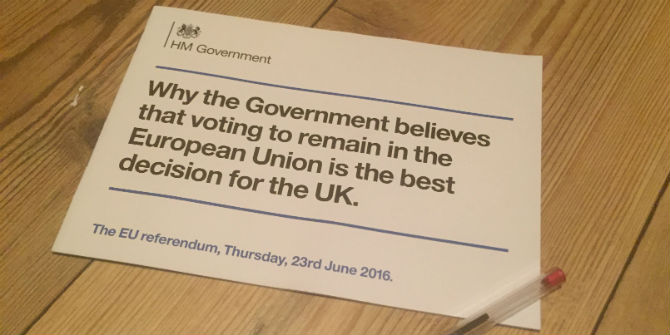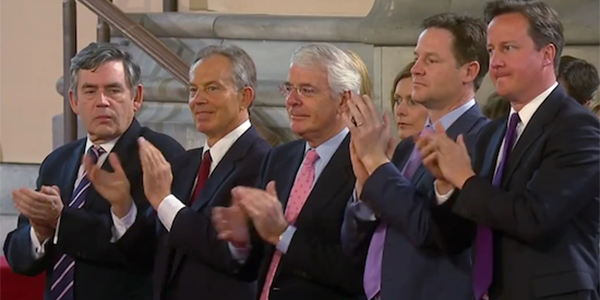 Michael Jacobs discusses the alternative versions of Thatcherite economics being offered by the Conservative leadership candidates, which do not reflect the actual economic needs of the country today.
Michael Jacobs discusses the alternative versions of Thatcherite economics being offered by the Conservative leadership candidates, which do not reflect the actual economic needs of the country today.
The Conservative Party leadership election is only a few days old, but the key battle lines have already been drawn. On the one side stands Rishi Sunak, proclaiming his Thatcherite credo of small government, balanced budgets, and cutting national debt. On the other are all the other candidates, proclaiming their Thatcherite principles of low taxation and spending. While the latter are all promising immediate tax cuts if elected leader, Sunak warns against such ‘comforting fairytales’. Unfortunately, neither interpretation of Thatcherism will address the country’s current economic troubles.
To understand this confusing debate, one needs to delve into Conservative history – and mythology. It simply isn’t true that Margaret Thatcher cut taxes. Yes, she cut income tax rates. During her premiership, between 1979 and 1990, the basic rate was reduced from 33% to 25%, and the top rate slashed from 83% to 40%. But at the same time, she raised both VAT (from 8% to 15%) and National Insurance contributions. The result was that the overall share of tax in the economy hardly changed: it was 30% in 1978-79 and still 30% in 1990-91.
Thatcher did cut the size of the state. During her premiership, total managed expenditure (that is, not including welfare benefits) fell from 44% of GDP to 38%. But this was a result of economic growth, not cutting spending: in real terms, public spending grew under Thatcher by an average of just over 1% a year. The strong economic growth in the latter period of her premiership also enabled Thatcher to reduce public debt: from 42% of GDP in 1978-79 to just 23% in 1990-91.
So of the two claims to be following Thatcher the leadership candidates are offering (cut tax, or cut debt), Sunak’s is the more accurate. Yet you can see why all the other leadership contenders want to cut taxes. Sunak’s recent and forthcoming tax rises will take the share of tax in national income to its highest level, almost 36% of GDP, since the late 1940s. But this has happened for two reasons that the contenders cannot just wish away.
One is the growth of post-COVID public spending they have all supported – notably on the cost-of-living crisis, the NHS, and supplying arms to Ukraine. The other is Brexit, which almost all of them also supported. The Office of Budget Responsibility estimates that Brexit will lead to a 4% drop in GDP. Following almost a decade of weak growth during the austerity years, the result is a significant shortfall in tax revenues.
But this is not, in fact, the main reason why the Conservatives’ continuing preoccupation with Margaret Thatcher is unhelpful. It’s that the British economy today is fundamentally different from the one that confronted Thatcher when she was in Downing Street. In the mid-1980s, manufacturing made up almost a quarter of national output, with services at 60%. The financial sector was around 6%. 13 million workers belonged to trade unions. Thanks to newly abundant North Sea Oil, for most of the 1980s the UK had a trade surplus. Today, thanks partly to Thatcher’s policies and partly to the continuing processes of globalisation and deregulation that have occurred since, the British economy has hugely changed. Manufacturing is now around a tenth of national output, services 80% and the financial sector 9%. Trade union membership has halved and approaching 4 million people are in low-paid, insecure work. The UK has a persistent trade deficit.
A different kind of economy requires different kinds of economic policies. The reason that wages have barely risen in the UK since 2008 is because productivity has been almost stagnant. To improve productivity we need investment. In the mid-1980s, investment fluctuated between 20% and 25% of GDP. Today it is around 15%.
How can investment be raised? All the Tory leadership contenders except Sunak will pledge to abandon his planned increase in corporation tax, hoping that this will encourage businesses to invest more. But there is little evidence that it will. Germany has a higher level of business investment than the UK despite a corporation tax rate of 30%, compared to the UK’s 19%. Businesses don’t invest because of the tax rate on their profits. They invest when they are confident that they will make profits, because there will be sufficient demand for their products.
So raising the rate of investment needs more government, not less. It needs an active and nationwide industrial strategy in which public investment leverages private. There are huge needs and opportunities for such investment, from green infrastructure (such as home insulation, railways, and renewable energy) through innovating export sectors (such as life sciences and electric vehicles) to the caring sectors (physical and mental health, social care, and childcare). The latter will allow more people, especially women, to enter the labour force, which the economy desperately needs. At the same time, only a clear and concerted commitment to sustaining aggregate demand will give businesses the confidence to invest themselves. Only this will enable productivity to rise, thereby allowing wages to rise without inflation. And in turn, only this has a hope of making ‘levelling up’ an actual policy, rather than just a slogan.
Recognising all this, Theresa May made industrial strategy a central element of economic policy. She was drawing on an important Conservative tradition now usually associated with Michael Heseltine, when he was in charge of the 1980s equivalent of ‘levelling up’ in Thatcher’s Cabinet. But it is not part of Thatcherite mythology, so never mind the actual economic needs of the country today; none of the current leadership contenders will support it.
Given that they must appeal to an almost entirely Thatcherite electorate – first their fellow MPs and then the wider Tory party membership – we should not really be surprised at all this. But one of these contenders will be the next Prime Minister. And then their preference for ideological nostalgia over economic reality will risk making our already weak economy even weaker.
__________________
 Michael Jacobs (@michaelujacobs) is Professor of Political Economy at the University of Sheffield.
Michael Jacobs (@michaelujacobs) is Professor of Political Economy at the University of Sheffield.
Photo by Pawel Czerwinski on Unsplash.







